Text
S7E25: All Good Things...


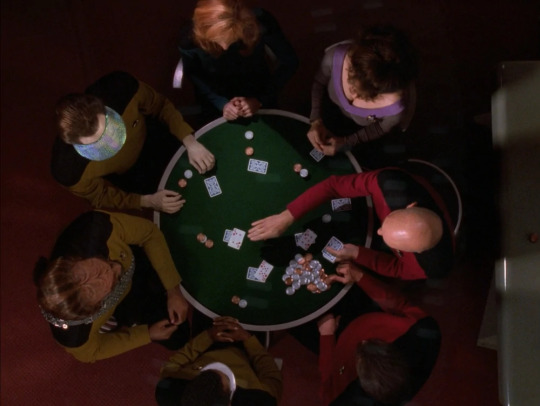
Recommendation: Watch
Rating: 6/10
Picard learns from Q that he is to be the cause of the annihilation of humanity and begins an incredible journey through time from the present, to the past when he first took command of the Enterprise, to twenty-five years into the future.
…must come to an end. If there's one word to describe TNG's series finale, it's Bombastic. On one hand, this is how it should be; who doesn't want to see this show go out with a memorable bang? But on the other, the episode is nearly 2 hours long and feels like it, becoming bogged down in places by lumbering plotting.
First of all - Q. There's a wonderful continuity to having the finale conclude the storyline that was set up waaay back in the premiere 'Encounter at Farpoint', for both narrative and nostalgia purposes. Q reappearing to judge humanity by proxy of Picard one more time, revealing that his trial at Farpoint never actually ended? This is great stuff. It sums up the show's themes of humanity growing beyond its limits, and as a story element presents Picard his final, ultimate challenge of ingenuity. The actual challenge itself though is a headscratcher. Sure Picard has to be 'smart' to work out the mysterious temporal anomaly in three time periods - the present, 7 years previously when he became Captain of the Enterprise, and 25 years in the future - but it's a challenge that relies entirely on Q letting him bounce around in time, without which it'd be impossible. Q implies he's giving Picard a little helping hand when he's really giving him the only key to the solution, and then telling him the solution outright. Does Picard solving a relatively straightforward puzzle really demonstrate anything grand about humanity?
Picard’s adventures in the three time periods are okay, but in each one his mission's the same, to get into the Neutral Zone and find the anomaly, so it gets a little repetitive. In the past there’s Tasha again and it’s enjoyable to see young Picard interacting with a crew that doesn’t know him yet. The clip of beardless Riker clearly pulled from old season 1 footage is a comically dumb inclusion. The main problems arise in the future sections. It’s not particularly fun watching a senile Picard ranting and raving; this is the sort of thing that might work but only in a standalone concept episode specifically about ageing, here it just gets tiring and drags the pacing to a crawl. The future timeline isn’t very fleshed out and seems to exist just to show us gags like Data with gray hair and "warp 13", and little ‘what if’s. The most inexplicable is that Troi is straight up dead in the new timeline. Why? Just so Riker and Worf are sad about something for the five minutes it remains plot relevant? There’s other implausibilities too, like Beverly taking Picard into the Neutral Zone and Riker destroying the Klingon ship.
What does work is how, after Picard tells them about the future he experienced, the present crew vow not to drift apart in their own future. I think leaning further into this idea as the ‘point’ of the future section, and taking away the semi-dystopian elements, would’ve made it a lot better. Picard's final conversation with Q gives a sort of meta contextualization to the rest of the episode, that it was part of the Q's test and not to be taken 100% literally, which helps it look better in retrospect. My favourite scene of all though is the very final one: the crew amiably playing a game of poker, which Picard at last joins in on. It's the sort of ending that makes you sad to leave these dear characters behind.
1 note
·
View note
Text
S7E24: Preemptive Strike
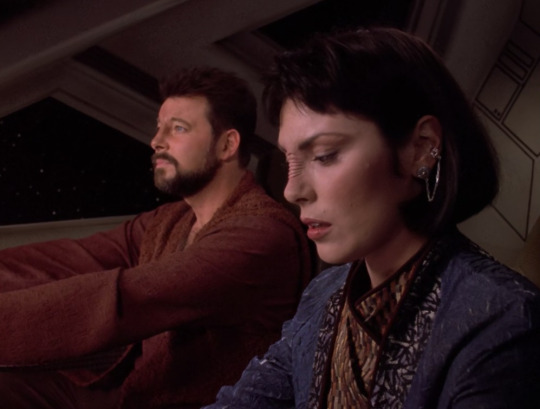
Recommendation: Maybe
Rating: 4/10
Lieutenant Ro is sent undercover to root out a Maquis cell.
Argh, this should really be a lot better than it is. Ro becoming torn between her duty to Starfleet and the anti-Cardassian Maquis is a good plot idea, and having her defect and betray Picard at the end is a brave conclusion for her character, but it's all done in an exceedingly basic, by-the-numbers way. The Maquis characters are unconvincing as a hardcore paramilitary cell, the 'emotional' scenes are so cliche they have zero impact, and from a certain point onward it's as if the script is on autopilot. I still do like the mentor/student relationship between Ro and Picard, and this dynamic was so initially compelling in Ro's first episode that it's disappointing she disappeared for much of season 6 and 7. At least there's some sort of wrap-up, but it's a fairly disappointing one.
Note: Ro was originally meant to star in DS9, but Michelle Forbes didn't want the role and so Major Kira was created instead. As much as I like Kira, I think Ro would've been a more interesting character for the role because her inner conflicts surrounding both religion and the Cardassian occupation provide a more fertile ground for character development. DS9 still turned out plenty good of course, so can't complain.
2 notes
·
View notes
Text
S7E23: Emergence
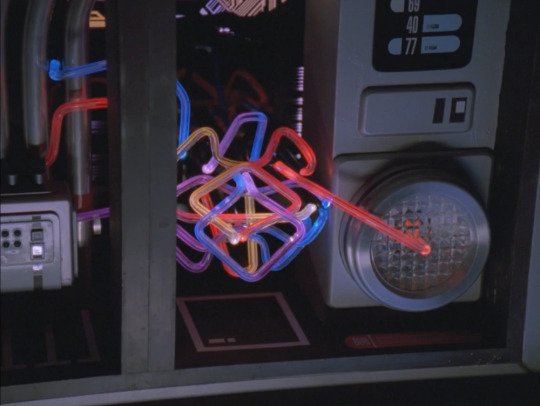
Recommendation: Maybe
Rating: 4/10
A series of puzzling events on and off the holodeck lead the crew of the Enterprise to a surprising conclusion: The ship is creating its own offspring.
The holodeck Orient Express does not present a very promising setup - I always grumble something like 'we've got to watch 45 minutes of these old timey people, again?' at the start of holodeck episodes - but thankfully the plot links the holodeck happenings with the strange malfunctions affecting the Enterprise very early on. It's intriguing at first looking for parallels, like how the two people making the puzzle represent the transporter and replicator systems, but the episode's big structural problem is that it just explains everything about the networked nodes and the lifeform they're creating by about 20 minutes in, and the rest is just watching it play out in an extremely predictable fashion.
The repetitive dialogue and lazy explanations aren't doing it any favours either. There's no way I buy that the Enterprise was going to get blown up by some random unrelated anomaly, just in time for the nodes to jump in and save it. And yet, despite the lack of any real surprises for half the episode, it does end up as quite enjoyable viewing in a brainless way, and Picard's closing comment about the lifeform emerging from the crew's experiences give a touch of meaning to the story that it would otherwise lack.
0 notes
Text
S7E22: Bloodlines
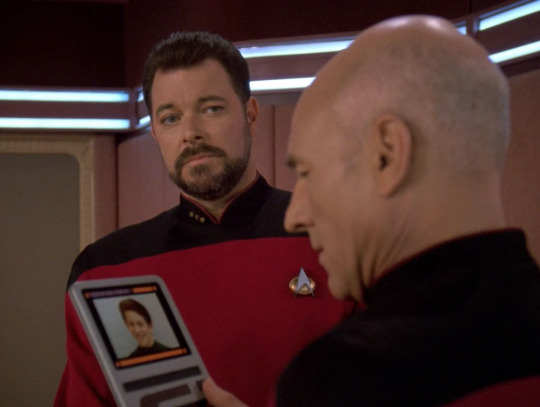
Recommendation: Watch
Rating: 7/10
DaiMon Bok threatens the life of a son Picard never knew he had.
This is what you can do by keeping a story simple, focused and gimmick-free, and just relying on good writing. Picard having to come to terms with parenthood is hardly an ambitious or wildly original episode concept but it's done very well indeed, really letting Picard's established character shine in a believable way. Jason might come off like a bit too much of an asshat at first, but we eventually see a sympathic side to him and it makes watching Picard have to let him go at the end especially tragic and touching. DaiMon Bok from 'The Battle' way back in season 1 is a surprising appearance, and still a rather silly slapstick villain, yet the episode skillfully shunts the storyline of his revenge plot to kill Jason into the backseat, only letting it take precedence when it has a genuine purpose in advancing Picard's relationship with Jason. Unassuming but solid.
1 note
·
View note
Text
S7E21: Firstborn
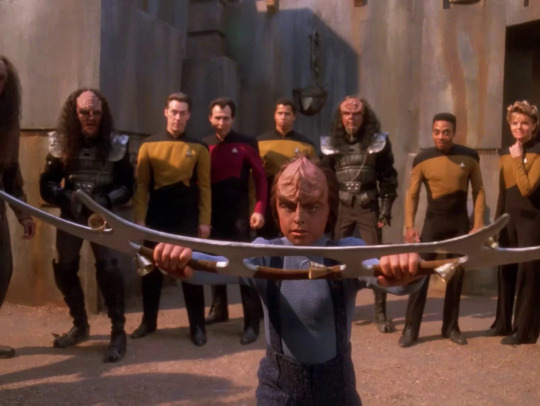
Recommendation: Skip
Rating: 4/10
A mysterious family friend and advisor encourages Worf's son Alexander to become a warrior.
At long, long last: no more Alexander. Thank Kahless! Saying that, he's not actually too unbearable in this one and the episode is mostly okay until a last minute, totally absurd twist that really scuppers it. The visiting K'Mtar putting more and more pressure on Alexander to become a warrior for the good of their house creates a decent conflict within Worf, and the resolution he comes to with Alexander at the end is nice. This does feel like a very bog-standard Klingon episode though, and it's lacking the gravitas and closure a story so close to the end of the show really ought to have. The Duras sisters are here and campy as ever, because of course. They're such petty, minor villains to be given the single longest story arc in TNG, but you still have to chuckle when they're there.
The Enterprise chasing leads on the sisters takes up way too much time, and again this really sticks out as trivial busywork at a time when the entire show is wrapping up. It's fun to see Quark have a cameo even if it'd make more sense for the Enterprise to be talking to Sisko instead. The shark-jump moment where K'Mtar reveals his true identity comes completely out of nowhere and not in a good way. Needless to say it's ridiculous, is given no proper explanation or conclusion, and there's several other plot threads that are basically just dropped into oblivion to make room for it, like how they were taking the sisters to the homeworld, but the episode just... ends before that happens. It's so jarring it's like the whole thing was just added to the script at the last second.
Note: After finishing this review I came across this in the Wiki's production notes. The original script apparently "just seemed a little ordinary so we started messing around with it". No comment.
0 notes
Text
S7E20: Journey's End
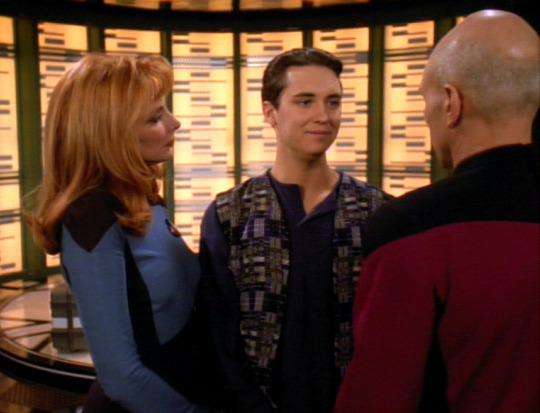
Recommendation: Maybe
Rating: 4/10
As a result of a long-disputed treaty with the Cardassians, the Federation has agreed to return several planets to Cardassian control. One such planet, Dorvan V, is inhabited by the descendants of Native Americans. They do not wish to leave their new home, which they had spent many years searching for.
There's many and varied things wrong with Wesley's last episode, but it's certainly fascinating in its confusion and contradiction. Picard is tasked with evicting a tribe of Native Americans from their new home after the planet they live on is given to the Cardassians: this is a setup that practically screams 'Danger! This story requires a defter touch than the TNG writers are capable of in order to not be offensive!'; and lo and behold.
No, it's not as bad as Star Trek's actual worst and most offensive Native-themed episode, which is the Original Series' (who could have guessed?) awful 'The Paradise Syndrome'. There's cursory if performative respect given to the Native characters and Native history, and they're played by Native actors. But their culture and beliefs are presented in a very generic and stereotypical fashion - they go on vision quests, they don't want to leave their sacred land, etc. The show uses its usual polite yet condescending doublethink to sort of imply their beliefs have some truth to them while not abandoning the science fiction genre by confirming it either. You can decide, dear viewer, we don't want the responsibility. Chakotay's spiritual side would later be portrayed in a similarly generic way, but the difference is that it was just one part of his larger character so he still felt like an actual person, while here it's the Native people's entire character.
Wes' journey from angsty frustration with the Academy to going off with the Traveller at the end feels like the middle of a story that has no introduction and no conclusion. He's not been on the show properly since season 5 so this new side of his character comes from seemingly out of nowhere, which is regrettable because it deserves exploration. The Traveller is an ancient relic from season 1. Ah, it was a more innocent and naive time back then. Think back for a minute to 'Where no one has gone before', the show's sixth episode. We learn from the Traveller that fresh-faced Wes has a pseudo-spiritual connection with the Universe, and Time, or something. How will this theme develop over the series? As it turns out, by Wes getting written out of the show because audiences hated the brat, and then returning right at the end to go off and live with Native Americans to develop his spiritual powers. Or something. This is quite emblematic of the how the show would make big ambitious promises it couldn't deliver, and slowly, quietly bury them. And here they are, exhumed for nostalgia's sake, on a show they no longer bear any resemblance to.
There are still some good things about this. I like the writing between angsty Wes and Beverly, and for all its flaws the plot is quite narratively satisfying. It's clever how at the end as violence breaks out between the Natives and the Cardassians, Wes and the Traveller can see it all from an outsider's perspective, and you think Wes is going to solve it with deus ex machina magic powers, but then it turns out Picard and the Cardassian captain still have to resolve the situation through diplomacy like usual. Overall an odd sendoff for Wes, which tries to tie up the loose end of the Traveller storyline, but I think that's a thread I'd rather see left dangling if we could've gotten some proper character resolution for Wes instead.
0 notes
Text
S7E19: Genesis
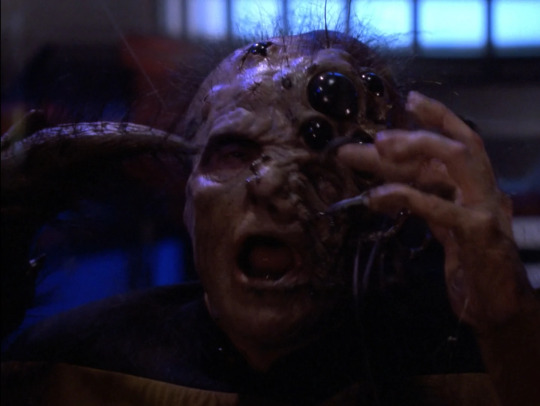
Recommendation: Skip
Rating: 4/10
Enterprise crew members de-evolve into prehistoric creatures after a medical treatment by Dr. Crusher goes wrong.
Like a really gross 80s horror movie in all the wrong ways. First off, despite the valiant attempts to explain it as 'DNA introns being reactivated', the de-evolving virus is biologically nonsensical and clearly just an excuse to have the whole ship turn into beasties. It would be easier to accept the artistic license here if the virus was caused by an infection from some exotic lifeform or something, but the whole thing is apparently down to Barclay getting a flu jab? The infection spreading around from said flu jab and making everyone act more and more craaazy is extremely rote for the series by now too.
The story sending Picard and Data away on a shuttle so that they come back to the monster-anarchy onboard the ship is a decent setup that's worked well in other episodes and works well here. But the plot from this point veers too far ahead of 'creepy' and into rather disgusting body horror, and even jumpscares. Who watches Star Trek for jumpscares? There is some very funny moments in this, like Data stonily informing Picard that he's going to transform into a pygmy marmoset, but the humor feels out place amid all the other horrific stuff going on. Picard and Data spend their time walking around with a comical lack of urgency, stating obvious facts at length, and looking at the five other cast members the episode had the budget to create mutated animal costumes for like they're on a trip to the monster zoo. Grim.
2 notes
·
View notes
Text
S7E18: Eye of the Beholder
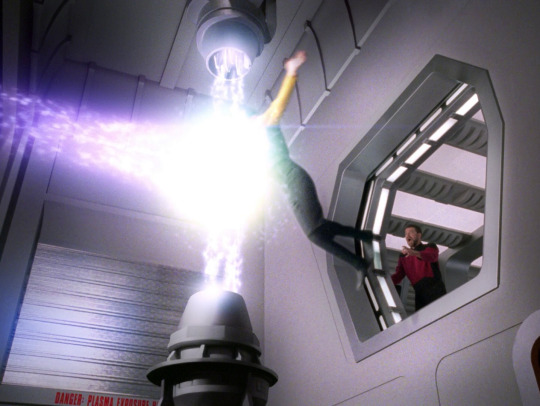
Recommendation: Maybe
Rating: 5/10
Counselor Troi's investigation into the suicide of a crewman suggests a murder was committed aboard the Enterprise while it was being built, and that the murderer is still aboard.
After the suicide in the opening sequence, a full third of the episode is spent drably going through the motions: they investigate and talk to the loved ones, they muse briefly on the nature of suicide in a very surface-level way, you get the picture. It's dull and cliche content. The plot significantly picks up as it surprisingly transforms into a sort of psychological murder mystery however. Troi's flashback to events 8 years ago is crappily executed but there's some respectable intrigue and a nice 'a-ha' moment at the end when it's resolved.
Like "Parallels", the most interesting part of this might be the (again, ultimately retconned) relationship between Troi and Worf, which continues to exceed the admittedly low standards of Trek romances. I guess it's a bit late in the game to add a whole new thing between them, so we get little alternate-reality/hallucination flings instead, and I actually wish it wasn't brushed aside so flippantly at the end of this one. Never thought I'd want more romantic content in this show, but there we go.
1 note
·
View note
Text
S7E17: Masks
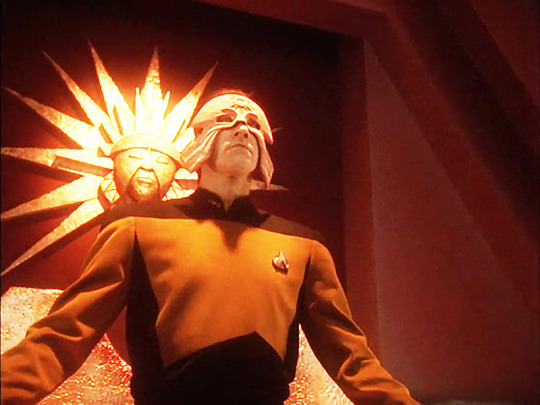
Recommendation: Maybe
Rating: 4/10
While investigating a rogue comet, the cultural archive concealed inside begins taking over both the Enterprise and Data.
Oh, Masks. Famously one of the most-hated episodes of the show, I actually think that aside from the final 10 minutes its negative reputation isn't totally deserved. It's highly bizarre and features some of the most wacked-out shit to ever occur on TNG, but I find it hard to deny the storytelling ambition on show here, and some tweaks and polish could upgraded it from 'too weird' to 'weirdly good'. The first few acts are promising enough, and everything initially seems standard fare for the show. They discover a comet, the alien construct inside it starts taking over the ship; so far this could be any other episode. Characters do act rather illogically though, with no one seeming alarmed that there are random alien artifacts appearing in the ship, and it's very out-of-character for Picard to order the construct destroyed - if that man loves anything in the universe, it's dusty old relics.
Data being possessed by multiple alien personalities goes over surprisingly well, and I enjoy the concept of the ship getting slowly transformed into a freaking Aztec-inspired temple, it's outrageous but in a fun way that gives the episode a very unique atmosphere. Masaka's throne room with its massive sun symbol is legitimately very good set design too. It's the final section that proves most divisive, as Picard communes with the personalities in Data and deciphers symbols to work out how to defeat Masaka, and ultimately dons the stupidest-looking mask in television history. I'd seen pictures of Picard in the mask before watching this, and I'd assumed it was only a meme. It really has to be seen to be believed. The final confrontation between Data as Masaka and Picard pretending to be her nemesis would be far too silly to take seriously as it is, but the masks make it howlingly funny.
Here's the thing though. People hating on this episode tend to claim that it "doesn't make sense", but I don't agree. The mythology of the aliens and the way Picard uses the symbols to understand it, these things form a cohesive narrative and seem to have been thought out quite carefully, and it ties into Picard's passion for archaeology. Okay, it doesn't make sense why all of this stuff would be coded into the alien construct in the first place if they're all so scared of Masaka, but still. There's wonky writing throughout and the episode totally goes off the rails with the masked-up scene at the end and never gets back on them, but it was a bonkers ride up until then. How much you enjoy this will depend on whether you enjoy bonkers rides for the sheer sake of it.
0 notes
Text
S7E16: Thine Own Self
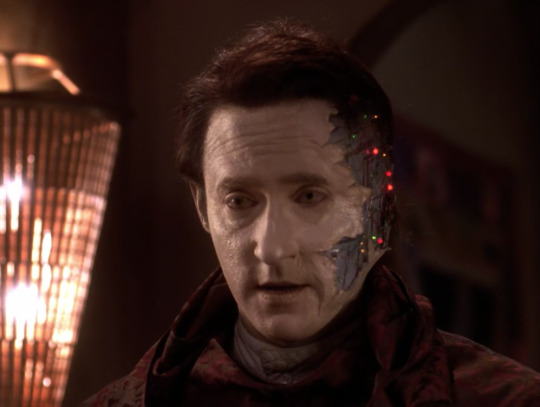
Recommendation: Maybe
Rating: 6/10
Data suffers amnesia in a primitive society while Troi applies for a promotion.
For better or worse, this is a very typical, representative episode with its "main character in a conundrum on an alien world" main plot and its comedic, lower-stakes sideplot on the ship. You could show this to someone who's never watched a minute of Trek and they'd get the gist. Data losing his memory and having to conduct experiments to understand what's been causing the villagers' sickness is simple but effective, and I particularly like the setup with the box of radioactive metals that get turned into jewellery because to the audience it's very clear what's going on but Data has to reason it out empirically, creating some nice dramatic irony.
Meanwhile Troi is taking her bridge officer exams, and it's funny to watch Riker being forced to keep failing her over and over. Even if it does all resolve itself a bit abruptly at the end, this is not bad as far as little sideplots go. The problem is the main plot and sideplot have no connection between them so the episode ends up just jolting back and forth between these two stories that never interact in any meaningful way. Maybe the newly-qualified Troi could be on the away team that tracks Data down at the end or something?
2 notes
·
View notes
Text
S7E15: Lower Decks
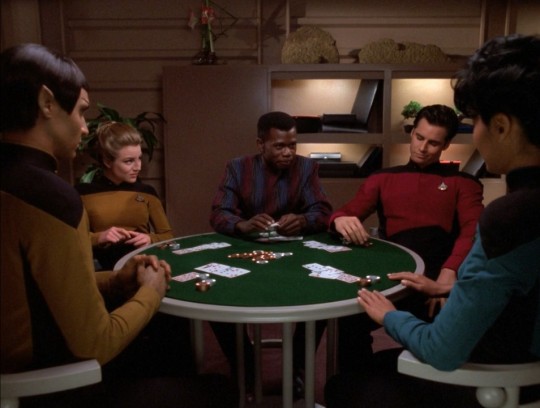
Recommendation: Watch
Rating: 10/10
Junior officers speculate on the reasons for recent unusual actions taken by the command crew near the Cardassian border.
There was a sense of wistfulness for me upon finishing this due to a question that arises from it: What if the whole show, every episode of TNG, had had this episode's quality of writing, its daring to do something different, and its human touch, for lack of a better phrase. Scenes of the four lowly ensigns conversing, just talking, sound like actual people's conversations; in other moments something will be said only through a character's expression and the show will trust you to understand, without having to blurt out the obvious; and it makes you realize what you've been missing. I think that in the universe where TNG is always like this it's the best show of all time.
The concept is smart right from the get-go, as we see things strictly from the perspective of the ensigns - so strictly that we're only allowed to see a scene if one of them is present. This works brilliantly with the Cardassian plot, which would be a bit dull in a normal episode, but becomes fascinating when revealed in the bits and pieces gleaned by these ensigns. They know something's up, but all they see is the higher-ups conferring. In "Hollow Pursuits" we also got to see the senior staff in a new light via Barclay, and the roles Riker, Picard and Worf play this time as a hated boss, stern master and mentor respectively to the ensigns are just as great as that episode.
This exploration of the chain of command and social hierarchy never works better than in the dual poker games. This genius sequence is not only funny but packs in so many clever parallels and contrasts between the ensigns' game and the senior staff's game. Eventually one of the ensigns is invited through the barrier between the ship's echelon and its mere workers, leading to an ending that is genuinely sadder than anything that's happened on this show to any of the main crew we already know and care about. Simply great in every respect.
5 notes
·
View notes
Text
S7E14: Sub Rosa
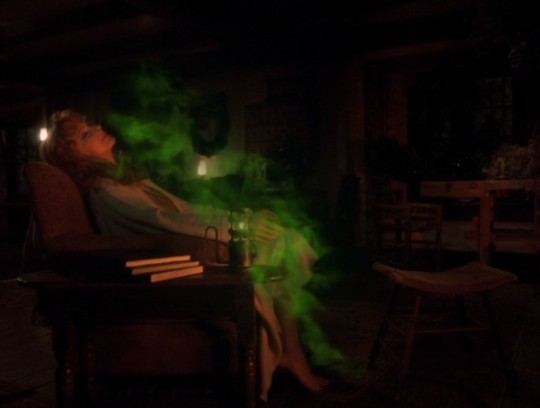
Recommendation: Skip
Rating: 1/10
Beverly Crusher attends her grandmother's funeral, but a mysterious entity that inhabited her grandmother is now focusing on her.
Goodness gracious. In all honesty, there's little point explaining what's so bad about this because the plot synopsis "Doctor Crusher is haunted and seduced by a Scottish ghost", well, doesn't that say it all? This whole idea is just so obviously terrible from the very start. The haunted house concept clashes horrendously with scenes of the Enterprise's pristine bridge, the 'Scottish highlands planet' populated by caricature characters is as stupid as it sounds, and Crusher is a poor choice of character for the part. I nearly always avoid praising or criticizing the skill of individual actors because I think this is not nearly as important as the writing, pacing, themes etc., but this episode is sadly beyond Gates McFadden's abilities. It's all ill conceived in every respect. Did no one, at any stage of the production process from pitch to script to filming, look it over and realize that it quite simply sucks?
1 note
·
View note
Text
S7E13: Homeward
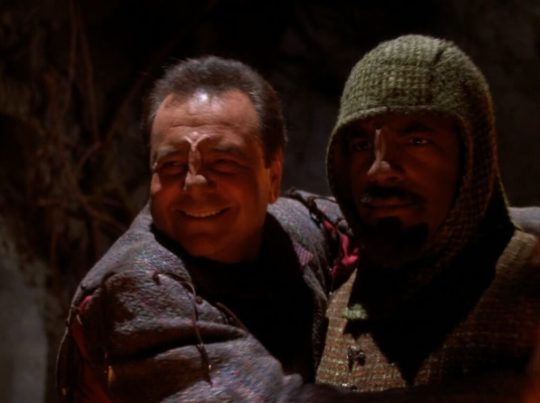
Recommendation: Maybe
Rating: 6/10
Worf's foster brother violates the Prime Directive by saving a group of villagers from a doomed planet.
"Secret relative" is one of Trek's worst tropes but I have to say that the dynamic between Worf and his brother Nikolai (my namesake!), combined with the latter's likable personality, make a good core for this episode. Nikolai going rogue and breaking the Prime Directive to move a village of Boraalans to a new planet via the Enterprise's holodeck works because it gives the crew this one-episode licence to just throw out the Prime Directive for a while, and it's hard not to take his side in the matter.
The Boraalans themselves are basically generic Star Trek 'ignorant naive alien villagers' like we've seen in a dozen episodes before this - it'd be nice if they had some part in the story beyond placidly following Worf and Nikolai around like sheep. The guy that wanders out of the holodeck is the story's compensation for this, and it's well done at first, but the way he's abruptly written out at the end just seems like they didn't know what else to do with him. In general, the writing for anything to do with the villagers is not great but the dialogue between the brothers makes up for it. Also, Worf hastily explaining to the villagers that a glitch in the holodeck is "the sign of La Forge" is hilarious. A basic but enjoyable watch.
1 note
·
View note
Text
S7E12: The Pegasus
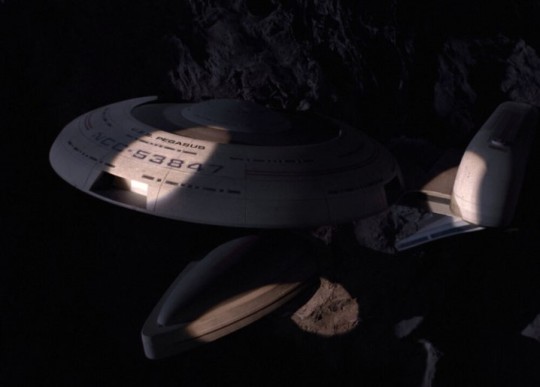
Recommendation: Watch
Rating: 6/10
When Riker's first commanding officer comes aboard to aid in the search for the vessel they served on, he is forced to rethink the actions he took at that time.
Even though it has nothing to do with the rest of the episode, it's worth watching this just for 'Captain Picard Day'. After that hilarious opening it's onto a pretty good Romulan cold war type thriller. The tension between Riker and his old captain who's come aboard to direct a secretive mission creates a compelling enough mystery surrounding what happened on their old ship 12 years ago. That being said, Picard's frustration at being kept in the dark goes over better than Riker's continuous arguments with the Admiral, which end up repeating several times with little variation.
The big reveal of the Federation's cover-up of its illegal cloaking device project is cool and it's nice to see the Enterprise be forced into using it, but the episode struggles a bit with the plotting before and after this reveal. The Enterprise drifting around the asteroid field looking for the Pegasus for ages is slightly dull, and after they find the device it feels like a dramatic climax is due but never arrives; they just study it, activate it and escape the asteroid without a hitch. Serviceable without being anything extraordinary.
2 notes
·
View notes
Text
S7E11: Parallels

Recommendation: Watch
Rating: 6/10
After Worf returns from a bat'leth tournament, he is the only person who notices subtle changes on the Enterprise.
The mix of humour and plot is just right, and it's an enjoyable ride as a result. Worf is an interesting choice of main character for a 'character thrown between parallel universes' story, and I'm frankly just glad to see him doing something other than fighting, rambling about honour or talking to Alexander (mercifully absent). That said, Worf isn't the quickest to react or put things together so the first third or so does get into this repeating pattern of something inexplicably changing and Worf haplessly going 'Hold on... something's changed...' It gets better when he has Data and the others helping figure out what's happening to him without him having to explain it all again every time.
All the other Enterprises appearing around the fissure at the end is a lot of fun - it scratches that 'what if...?' itch. There's some messy plotting surrounding it though, especially the dumb idea that Geordi's visor can somehow cause Worf to slip into parallel universes, but this isn't the sort of story you care much about that. The biggest surprise is how well the relationship between Worf and Troi, who's his wife in some universes apparently, is explored. I like how it calls back to him asking her to look after Alexander in "Ethics", and overall the writing of the scenes between them, both in the main and alternate universes, portrays a nice friendship-slash-maybe-relationship. Fun, funny and a bit sweet.
Note: Very funny that someone explains clearly at the start that Alexander's away and we don't have to worry about him this time. I can hear the writers groaning about how they'd integrate him into the plot and just saying 'screw it'. And thank god too.
2 notes
·
View notes
Text
S7E10: Inheritance
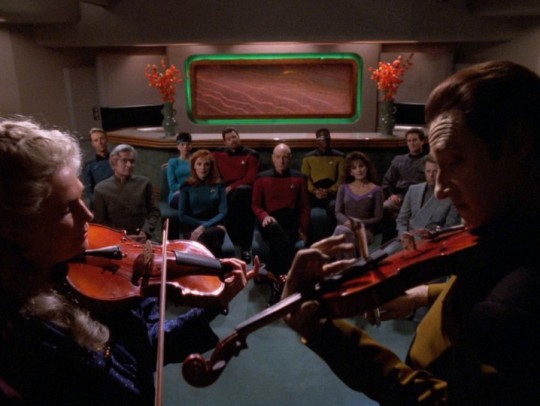
Recommendation: Skip
Rating: 3/10
Data meets Juliana Tainer, former wife of Dr. Noonian Soong and Data's "mother," but she holds a shocking secret that even she doesn't know she carries.
Contrived and formulaic, but I could just about live with those things; what really wrecks this is how irritating Data's 'mother' is. Personality-wise she's weirdly similar to the woman who destroyed the Crystalline Entity back in 'Silicon Avatar', but she's supposed to be likable here rather than a tragic villain. I really can't stand the maternal nostalgia angle to her interactions with Data, it goes over worse than most overly-anthropomorphizing Data stories. Also, if this episode thinks I'm gonna buy that she doesn't know she's an android then it's got another thing coming. Data's conundrum at the end over whether to tell her she's an android or not is absolutely leagues better than the rest of the episode and perhaps even starts the process of redeeming it, but ultimately I think it's too little too late.
2 notes
·
View notes
Text
S7E9: Force of Nature

Recommendation: Maybe
Rating: 6/10
Investigating the disappearance of several ships, the Enterprise discovers two scientists who claim that warp drive is destructive to the fabric of subspace.
It takes too long to get going but there's a thought-provoking plot when it does. The climate change allegory of the subspace rifts is simple but manages to sidestep the issue of being too on-the-nose or preachy - it's not bad for 2022, let alone 1993. It's clever the way the two scientists are initially made to seem irrational but later come to act as symbols for the frustration of climate scientists not being taken seriously, and the problem being warp drive hits somehow personally; you identify with Picard's and Geordi's shock that by zipping around at warp speed for 7 seasons they've become partly responsible for this.
However, the first half is excessively slow-paced. The sideplot about Data trying to train Spot is boring and not very funny, and there's whole scenes of Data and Geordi just crawling around discussing the principles of cat training for minutes on end. The Ferengi ship attacking them is also redundant plot-wise and is clearly there to just fill up time. Once the rift opens though, the Enterprise having to rescue the other ship without using warp is a decent bit of peril.
0 notes